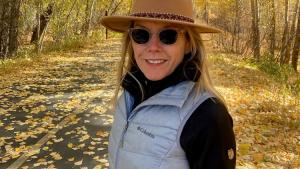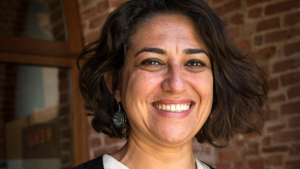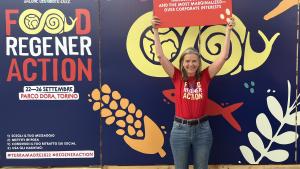“What’s for dinner?” A universal question highlighting the current social, cultural, and environmental problems faced by those deeply impacted by the syndemic. In Arizona specifically, home to 22 federally recognized tribal nations, more than just blue corn and tepary beans weigh down dinner plates. For Arizona’s Native communities, food apartheid, obesity, traditional food inaccessibility, loss of cultural knowledge, border issues, climate change, and COVID-19 have all found their way into homes, and kitchens. Our team recognizes that the lack of access, education, and preservation of traditional foods has been a compounding problem for Arizona’s Native Communities. We feel that this cultural starvation, craving for more, deserves to be fed. In Arizona, today, creating content that educates, protects, and promotes these culturally significant foods is the solution to these synergistically related problems. Arizonans have lost connections to our ecosystems’ healthy Native foods; thus reintroduction, preservation, and protection are the key to more sustainable and healthier diets. The creation of our multimedia food TV show, “Taste of State 48,” is that solution.
Joan McGregor, professor of philosophy and senior sustainability scholar, has been working on justice food systems including the problems facing Indigenous food systems for over ten years. In 2016, she led the successful Dinner 2040: The Future of Food which was a collaboration of humanities and arts scholars with community leaders in the Valley. She organized with Rebecca Tsosie at the Heard Museum an all-day workshop on Indigenous food systems in 2012. She has collaborated with Juliann Vitullo on projects including one of the first Humanities Lab courses on sustainable food systems. McGregor is now the chair of Slow Food Phoenix which will bring a depth of knowledge about the Arc of Taste and other projects that Slow Food USA and Slow Food International are engaged in.
Born and Raised in Arizona, Amber Sampson is a trained professional chef, currently earning her Masters in Gastronomy from Boston University. She studied race, class, and consumption at Harvard University, brought ancient bread to life with fellow anthropologists from Yale, and was awarded the prestigious US Government’s Gilman Scholarship for archeological research with Arizona’s O’odham Nations. She currently works at the Pueblo Grande Museum in Phoenix, as the Indigenous Foodways Facilitator, and with the Arizona American Indian Tourism Association.
Heading up the “Taste of State 48,” team, her food-based connections to Arizona, fuel every step of this project. She is currently a board member of Slow Food Phoenix. Sampson has spent her career cultivating trusted anthropological relationships with the Indigenous, local, and native communities in Arizona. Keeping the goal in mind to use Arizona’s rich gastronomic past, to create a more sustainable food future.
Sarah El-Sayed has a joint position as the co-director of the Biomimicry Center and assistant research professor at the Swette Center for Sustainable Food Systems. El-Sayed has a doctorate in food system sustainability, specifically on regenerative food practices in arid regions, and a master's in Biomimicry both from ASU. She also has a Biomimicry Professional Certificate from Biomimicry 3.8. She held a postdoctoral position at the School for Future innovation and Society, in Public Interest Technology. Her research interests include exploring ways to have more regenerative and net-positive local food systems, she is currently involved in the local Arizona food space. Previously she worked as a researcher in Biomimicry and microbial geographies. She is the co-founder of several enterprises in Egypt. Nawaya is a social enterprise working as a catalyst to transition small-scale farmer communities into more sustainable ones through education and research. Dayma an LLC responsible for outdoor Environmental Education, teaching young adults about Biomimicry and local Egyptian communities. Clayola is an LLC producing low-tech irrigation systems. She is an avid traveler, nature lover, and enjoys tasting foods, cooking and interacting with people through food experiences. Sara is on the board of Slow Food, an international movement that started in Italy aiming to safeguard local food cultures and traditions and does so by promoting Good, Clean, and Fair food for all.
Juliann Vitullo, co-director of the Humanities Lab, associate professor of Italian, and senior sustainability scholar, engages in research and community service that emphasizes the importance of preserving the cultural and ecological knowledge of traditional and Indigenous foodways, including those of the Southwest, for a more equitable and sustainable future. As co-director of the Humanities Lab, she has organized a number of Labs that challenge students, faculty, and community members to collaboratively work towards a more equitable, healthy, and sustainable food system, both locally and globally. A new member of the Slow Food Phoenix board, she has also created and maintained for the past two years, a subscription program through Sun Produce Co-operative that gives access to fresh produce from local and Indigenous farms to members of her community, including those who are SNAP eligible.
Eduardo Morales is a creative, friendly, writer, broadcaster, and videographer who loves to learn about new things. Morales grew up in Yuma, Arizona, and his whole family worked in the agricultural industry. Morales also has experience in the industry, however, as he currently
works part-time for a food safety company. He is also currently interning at the Arizona Republic, is a Cronkite Ambassador, and also attending Arizona State University Cronkite School of Journalism and Mass Communication in pursuit of a Sports Journalism degree. Morales likes to use sports, the news, and videography to bring attention to important and influential topics. He currently works and goes to school in the downtown Phoenix Area.





